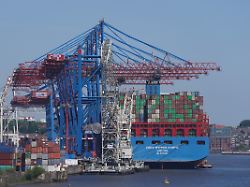Capital outflows continue to rise
Investors are fleeing Germany at record speed
6/27/2023, 6:31 p.m
Shortage of skilled workers, high energy prices: The list of disadvantages in Germany as a business location has recently become longer and longer. The investment flight seems to have no end. This is also reflected in the figures: in 2022 there will be a net outflow of 132 billion US dollars in direct investments.
According to a study, more and more investors are avoiding Germany as a business location, despite the recent settlements of large corporations such as Intel and Wolfspeed. In 2022, 132 billion US dollars more direct investment flowed out than was invested in Germany, as the “Handelsblatt” reported, citing a study by the employer-related Institute of the German Economy (IW). This is the strongest outflow among 46 states.
“The numbers are to be understood as a warning signal that the location is losing its attractiveness: demographics or high energy prices are affecting Germany,” IW economist Christian Rusche is quoted as saying. “Many problems are home-made.” High corporate taxes, leaden bureaucracy and an ailing infrastructure have made Germany less and less attractive.
After the net outflow of capital from Germany weakened between 2014 and 2018, it has reportedly increased sharply since 2019. Direct investments from other European countries dropped particularly dramatically: They fell from 79 billion euros in the previous year to just 13 billion euros.
Investment flight threatens to continue
According to a survey by the management consultancy Horváth among German industrial companies, the investment flight threatens to continue, writes the “Handelsblatt”: Almost every third company wants to reduce staff levels in Western and Southern Europe in the next five years, particularly due to high personnel costs, and increase their workforce in India, North America and China .
Whether the outflow of direct investments will be permanent has not yet been determined, Torsten Schmidt, head of economic activity at the RWI Institute for Economic Research in Essen, is quoted as saying. The inflows for investments in particular often follow multi-year cycles – after the drop, they would regularly go up again. But Schmidt also made it clear that the inflows had recently been “noticeably weak”.
